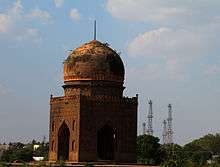Qasim Barid I
Qasim Barid I (r.1489-1504) was prime-minister of the Bahmani sultanate and the founder of the Bidar Sultanate, one of the five late medieval Indian kingdoms together known as the Deccan sultanates. Qasim Barid was a Muslim (Shia) Turk[1] [2] [3] domiciled in Safavid Georgia. He entered the service of the Bahmani sultan Muhammad Shah III and later became the prime-minister of the Bahmani sultanate.[4] Some have claimed that Qasim Barid was of Hungarian descent.[5]
Qasim Barid I led one of the first revolts against the Bahmani Sultanate. He was able to get himself made chief of state but had seriously undermined the stability of the kingdom.[6] The Bahmani governors of Junnar, Bijapur and Berar refused to acknowledge the authority of Qasim Barid and in June,1490 Malik Ahmad Nizam-ul-Mulk, the governor of Junnar founded the independent Ahmednagar Sultanate followed by the foundation of the independent Bijapur Sultanate by Yusuf Adil Khan and Berar Sultanate by Fathullh Imad-ul-Mulk in the same year.[7] The founding of the dynasty occurred in 1492.[8]
Qasim Barid died in 1504 and was succeeded by his son Amir Barid I, as the prime minister of the Bahmani Sultanate who also became the de facto ruler like his father.[4]

References
- ↑ Bowman, John Stewart (2000). Columbia Chronologies of Asian History and Culture. Columbia university. p. 276.
- ↑ Marshall Cavendish, Corporation (2007). "World and Its Peoples: Eastern and Southern Asia". p. 336.
- ↑ Holt, P. M. (1977). The Cambridge History of Islam:, Volym 2 (P. M. Holt,Peter Malcolm Holt,Ann K. S. Lambton,Bernard Lewis ed.). CAMBRIDGE UNIVERSITY PRESS. p. 29.
- 1 2 Majumdar, R.C. (ed.) (2007). The Mughul Empire, Mumbai:Bharatiya Vidya Bhavan, ISBN 81-7276-407-1, p.466
- ↑ QASIM, THE HUNGARIAN FOUNDER OF THE BARID SHAHI DYNASTY OF AHMADABAD BIDR, IN SOUTHERN INDIA - ELLIS s5-VII (178): 408 - Notes and Queries
- ↑ Qasim Barid (Bahmani minister) - Britannica Online Encyclopedia
- ↑ Majumdar, Ramesh Chandra; Pusalker, A. D.; Majumdar, A. K., eds. (1960). The History and Culture of the Indian People. VI: The Delhi Sultanate. Bombay: Bharatiya Vidya Bhavan. p. 268.
The provincial governors refused to acknowledge the authority of Qasim Barid. In June 1490 [Malik Ahmad Nizam-ul-Mulk] assumed independence in the city of Ahmadnagar founded by and named after him. His colleagues, 'Imad-ul-Mulk and Yusuf 'Adil, soon followed suit.
- ↑ webindia123.com-Indian History-Medieval-Delhisultanate-THE BAHMANI DYNASTY OF THE DECCAN